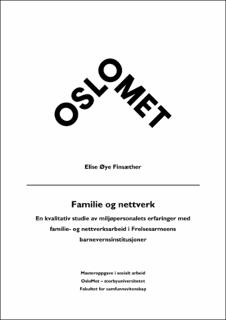| dc.contributor.advisor | Røysum, Anita | |
| dc.contributor.author | Finsæther, Elise Øye | |
| dc.date.accessioned | 2023-10-18T07:16:46Z | |
| dc.date.available | 2023-10-18T07:16:46Z | |
| dc.date.issued | 2023 | |
| dc.identifier.uri | https://hdl.handle.net/11250/3097163 | |
| dc.description.abstract | Masteroppgaven er en kvalitativ studie av miljøpersonalets erfaringer med familie- og nettverksarbeid i Frelsesarmeens barnevernsinstitusjoner. Arbeidet med familie og nettverk kan anses som viktig, ettersom ungdommenes familie og nettverk besitter mye informasjon om ungdommene, som for eksempel mulige triggere, beskyttelsesfaktorer og interesser. Et godt samarbeid kan dermed bidra til at ungdommene føler en trygghet i institusjonen, noe som videre kan skape en vellykket plassering.
Problemstillingen er «Hvilke arbeidsmetoder har Frelsesarmeens barnevernsinstitusjoner for samarbeid med ungdommenes familie og nettverk, og hvilke erfaringer har miljøpersonalet rundt dette?». Målet er å undersøke hvordan Frelsesarmeen arbeider med familie og nettverk i deres barnevernsinstitusjoner. I tråd med dette har jeg foretatt syv semistrukturerte intervjuer for innsamling av datamaterialet. Utvalget i studien er miljøpersonal som arbeider eller har arbeidet med ungdommene i hverdagen, og dermed erfarer hvordan familie- og nettverksarbeid blir utøvd i praksis. Datamaterialet er tematisk analysert. Funn drøftes i lys av tidligere forskning og de teoretiske perspektivene kunnskapsgrunnlaget i sosialt arbeid, standardisert forløp og konfigurasjonsperspektivet.
Studiets funn er tematisert i to hovedtema. Første omhandler arbeidsmetodene miljøpersonalet bruker i samarbeidet med ungdommenes familie og nettverk. Her belyses det at miljøpersonalet har ulike assosiasjoner til arbeidet med ungdommenes familie og nettverk, men i lys av arbeidsmetodene «standardisert forløp», «ukesamtale», «familiens plan», «familieråd», «nettverkskartlegging» og «erfaringsinnhenting» skapes det gjerne et helhetsbilde av arbeidet. Andre hovedtema tar for seg ulike utfordringer miljøpersonalet erfarer i familie- og nettverksarbeidet. Her fremheves undertemaene «utfordringer i foreldresamarbeidet», «utfordringer med ungdommenes nettverk» og «det skjer her og nå», noe som illustrerer kompleksiteten av familie- og nettverksarbeidet.
Diskusjonen viser at ungdommenes innflytting i en barnevernsinstitusjon kan forårsake endringer i familie og nettverk, samt ungdommenes tilgang på ressurser. Av dette diskuteres viktigheten av å kartlegge ungdommenes ressurser og hvilke arbeidsmetoder miljøpersonalet kan benytte i tråd med standardisert forløp. Videre belyser diskusjonen at ungdommenes vennenettverk kan være noe ustabile. I lys av konfigurasjonsperspektivet beskrives det at årsaker til dette kan være at noen ungdommer har utfordringer med å beholde venner over lengre tid, samt at ungdommene kan bli påvirket av miljøpersonalet til å avslutte negative relasjoner. Mange ungdommer har samtidig digitale nettverk, noe tidligere forskning beskriver som både positivt og negativt. Dette med tanke på at internett både kan være en arena hvor en opprettholder gjensidige avhengigheter, men også være en arena for ulike problembelastede miljøer. Diskusjonen setter også søkelys på miljøpersonalets bruk av kunnskap og syntetiseringen av den. | en_US |
| dc.description.abstract | This master thesis is a qualitative study of social workers´ experiences of working with family and network in the Salvation Army´s child welfare institutions. This type of work can be considered important due to the families´ and networks´ information about the teenagers. For example possible triggers, protective factors, and interests. Therefore, good cooperation may contribute to a feeling of safety as well as a successful placement in the institution for the teenagers.
The study´s research question is “Which work methods do the Salvation Army´s child welfare institutions have for cooperating with the teenagers´ family and network, and which experiences do the social workers have in this regard?”. This study aims to research how the Salvation Army works with family and network in their child welfare institutions. Seven semi-structured interviews have been conducted for the collection of data material. The participants in this study are social workers who work, or have worked, with teenagers in their everyday life and therefore have experience with how the work with family and network is performed. The data material is thematically analyzed. The findings are discussed with prior research and the theoretical perspectives of the knowledge base of social work, standardized course, and family configurations.
The findings are themed into two main themes. The first regards the working methods the social workers´ use when cooperating with the teenagers´ family and network. It shows that the social workers have different associations, but in light of the working methods “standardized course”, “weekly conversation”, “the families plan”, “family council”, “network mapping” and “collection of experiences”, they create an overall picture of the work. The second main theme is about various challenges social workers experience when working with family and network, where the sub-themes “challenges in the parents´ cooperation”, “challenges with the teenagers´ network” and “it happens here and now” is emphasized and illustrates the complexity of working with families and networks.
The thesis discussion shows that the teenagers´ move into a child welfare institution can cause a change in the teenagers´ family and network, as well as access to resources. Due to this, the importance of mapping the teenagers´ resources and which working methods the social workers can use in standardized course is discussed. Further, it is highlighted that the teenagers´ network of friends may be somewhat unstable. In light of the family configuration perspective, it is described that the causes of this can be that some teenagers struggle to keep friends over a longer period and that the social workers may affect the teenagers to end negative relationships. At the same time, many teenagers have digital networks, which previous research describes as both positive and negative. This considered, the internet can both be an arena to maintain interdependencies and for different problematic environments. The discussion further illustrates the social workers´ use of knowledge and the synthesizing of it. | en_US |
| dc.language.iso | nob | en_US |
| dc.publisher | OsloMet-Storbyuniversitetet | en_US |
| dc.subject | Barnevern | en_US |
| dc.subject | Familier | en_US |
| dc.subject | Sosialomsorg | en_US |
| dc.title | Familie og nettverk: En kvalitativ studie av miljøpersonalets erfaringer med familie- og nettverksarbeid i Frelsesarmeens barnevernsinstitusjoner | en_US |
| dc.type | Master thesis | en_US |
| dc.description.version | publishedVersion | en_US |
